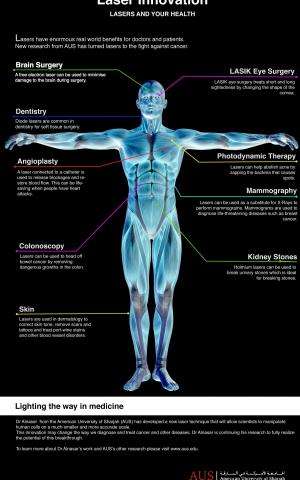Innovation in lasers could help fight diseases like cancer

A new laser based technique might give us advanced insights into the diagnosis and treatment of diseases like cancer.
Dr. Ali Sami Alnaser, Associate Professor in Physics at the American University of Sharjah (AUS), developed a novel experimental technique that enables the steering and controlling of chemical bonds inside hydrocarbon molecules on an unprecedented time scale. This means that scientists will be able to use lasers to manipulate human cells on a much smaller and more accurate scale.
The research has been conducted in collaboration with scientists from the Max Planck Institute of Quantum Optics and the Ludwig Maximilian University of Munich.
The team molded extremely short laser pulses to select which bond to break inside a certain molecule, and manipulated the outcomes of its interaction with the laser. They were able to capture and direct the trajectories of the electrons and atoms as they interact with the external laser radiation.
Dr. Alnaser's work is the first original scientific research from the UAE that was published in Nature Communications.
Experts in the field of physics lauded the paper noting: "The paper by Alnaser et al. demonstrates the possibility to control the hydrogen atom loss from hydrocarbons. Coherent control of chemical reactions is one of the most fascinating applications of ultrashort light pulses with both fundamental and practical implications. The idea of steering chemical reactions with light has been dreamt since the invention of laser sources. Indeed this research field has a great potential impact. In this framework, the results reported in the manuscript are novel, timely and open new perspectives in the field."
Dr. Alnaser was identified as a Distinguished Arab Scholar by the Arab Fund for Economic and Social Development in Kuwait in 2011. This fund provided him with a generous grant that allowed him to travel to Germany to pursue his research.
"This cutting-edge research hinges on the availability of the necessary laser sources that need adequate funding to obtain and operate. Despite the vast applications of these laser sources, they unfortunately don't exist in the Arab world," said Dr. Alnaser. "The presence of such laser facilities in the UAE will undoubtedly bring new advancements in sciences and engineering, and it will lead to new applications in medicine and industry, in addition to its service to the environment research," he added.
To celebrate this profound new research, AUS has created an infographic that details Dr. Alnaser's work and other innovations into lasers and medicine.
Continued research from Dr. Alnaser and others will allow us to explore new ways that lasers, and other tools, can be used to treat ailments, relieve pain and give us a greater understanding of diseases.
More information:
Dr. Ali Sami Alnaser is an Associate Professor in AUS's Department of Physics. His research about lasers was published on May 8, 2014 in the prominent scientific journal Nature Communications.
Provided by American University of Sharjah